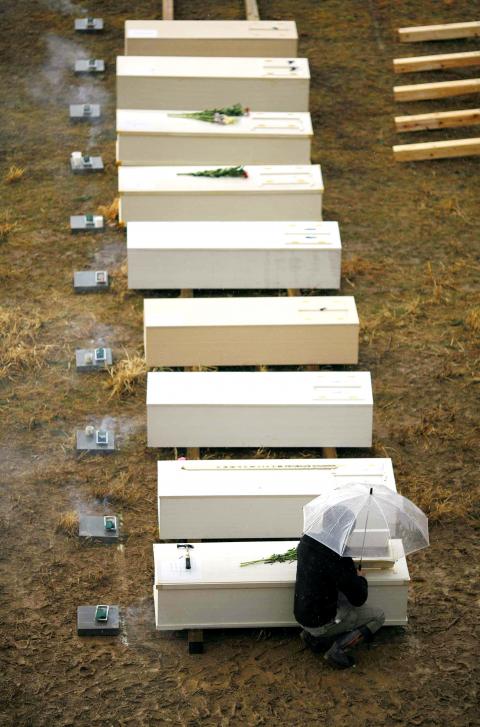Radioactivity levels are soaring in seawater near the crippled Fukushima Dai-ichi plant, Japan’s nuclear safety agency said yesterday, two weeks after the nuclear power plant was hit by a massive earthquake and tsunami.
Even as engineers tried to pump puddles of radioactive water from the power plant 240km north of Tokyo, the nuclear safety agency said tests on Friday showed radioactive iodine had spiked 1,250 times higher than normal in the seawater just offshore from the plant.
Officials said iodine 131 levels in seawater 30km from the coastal nuclear complex were within acceptable limits established by regulations and the contamination posed little risk to aquatic life.

Photo: Reuters
“Ocean currents will disperse radiation particles and so it will be very diluted by the time it gets consumed by fish and seaweed,” said Hidehiko Nishiyama, a senior official from Japan’s Nuclear and Industrial Safety Agency.
Despite that reassurance, the disclosure may well heighten international concern over Japanese seafood exports. Several countries have already banned milk and produce from areas around the plant, while others have been monitoring Japanese seafood.
Radioactive water was found in buildings housing three of the six reactors at the crippled plant. On Thursday, three workers sustained burns at reactor No. 3 after being exposed to radiation levels 10,000 times higher than usually found in a reactor.
Nishiyama said Japanese agencies were trying to work out ways of “safely bailing out the water so that it does not get out into the environment, and we are making preparations.”
He initially said the high radiation reading inside reactor No. 3, where the workers were injured, could indicate damage to the reactor. He later said it could be from venting operations to release pressure or water leakage from pipes or valves.
“There is no data suggesting a crack,” Nishiyama said. “Reactor No. 3 is the only one of the six that uses a fuel mixture of plutonium and uranium. Plutonium is the most deadly radioactive isotope.”
On Friday, Nishiyama chided plant operator Tokyo Electric Power Co (TEPCO) for not following safety procedures inside the turbine building.
More than 700 engineers have been working in shifts to stabilize the plant and work has been advancing to restart water pumps to cool their fuel rods.
Two of the plant’s reactors are now seen as safe, but the other four are volatile, occasionally emitting steam and smoke. However, the nuclear safety agency said yesterday that the temperature and pressure in all reactors had stabilized.
When TEPCO restored power to the plant late last week, some thought the crisis would soon be over. However, lingering high levels of radiation from the damaged reactors have hampered progress.
An official at the science ministry said that daily radiation levels in an area 30km northwest of the stricken plant had exceeded the annual limit. However, experts say it is still below levels of exposure from medical X-rays.
The Japanese government has prodded tens of thousands of people living in a 20km to 30km zone beyond the stricken complex to leave.
Japanese Chief Cabinet Secretary Yukio Edano said the residents should move because it was difficult to get supplies to the area, and not because of elevated radiation levels.

AGING: As of last month, people aged 65 or older accounted for 20.06 percent of the total population and the number of couples who got married fell by 18,685 from 2024 Taiwan has surpassed South Korea as the country least willing to have children, with an annual crude birthrate of 4.62 per 1,000 people, Ministry of the Interior data showed yesterday. The nation was previously ranked the second-lowest country in terms of total fertility rate, or the average number of children a woman has in her lifetime. However, South Korea’s fertility rate began to recover from 2023, with total fertility rate rising from 0.72 and estimated to reach 0.82 to 0.85 by last year, and the crude birthrate projected at 6.7 per 1,000 people. Japan’s crude birthrate was projected to fall below six,

Conflict with Taiwan could leave China with “massive economic disruption, catastrophic military losses, significant social unrest, and devastating sanctions,” a US think tank said in a report released on Monday. The German Marshall Fund released a report titled If China Attacks Taiwan: The Consequences for China of “Minor Conflict” and “Major War” Scenarios. The report details the “massive” economic, military, social and international costs to China in the event of a minor conflict or major war with Taiwan, estimating that the Chinese People’s Liberation Army (PLA) could sustain losses of more than half of its active-duty ground forces, including 100,000 troops. Understanding Chinese

SELF-DEFENSE: Tokyo has accelerated its spending goal and its defense minister said the nation needs to discuss whether it should develop nuclear-powered submarines China is ramping up objections to what it sees as Japan’s desire to acquire nuclear weapons, despite Tokyo’s longstanding renunciation of such arms, deepening another fissure in the two neighbors’ increasingly tense ties. In what appears to be a concerted effort, China’s foreign and defense ministries issued statements on Thursday condemning alleged remilitarism efforts by Tokyo. The remarks came as two of the country’s top think tanks jointly issued a 29-page report framing actions by “right-wing forces” in Japan as posing a “serious threat” to world peace. While that report did not define “right-wing forces,” the Chinese Ministry of Foreign Affairs was

US President Donald Trump in an interview with the New York Times published on Thursday said that “it’s up to” Chinese President Xi Jinping (習近平) what China does on Taiwan, but that he would be “very unhappy” with a change in the “status quo.” “He [Xi] considers it to be a part of China, and that’s up to him what he’s going to be doing, but I’ve expressed to him that I would be very unhappy if he did that, and I don’t think he’ll do that. I hope he doesn’t do that,” Trump said. Trump made the comments in the context